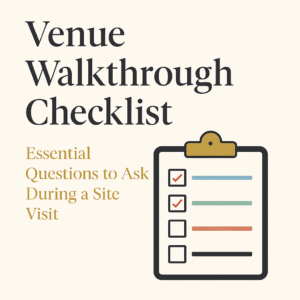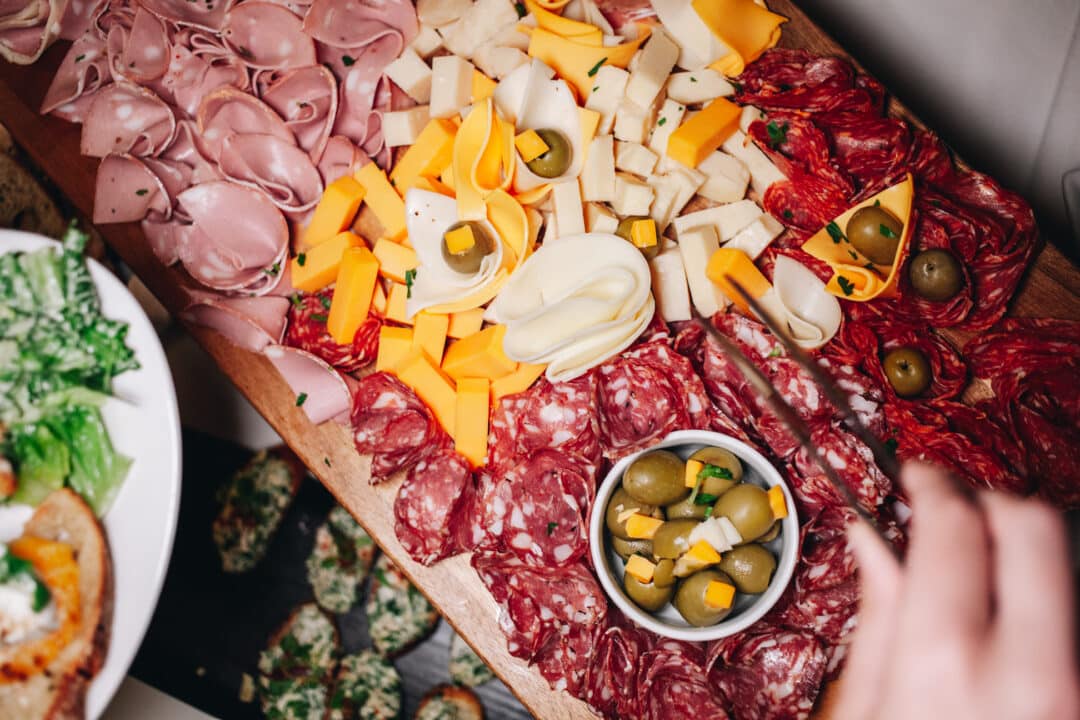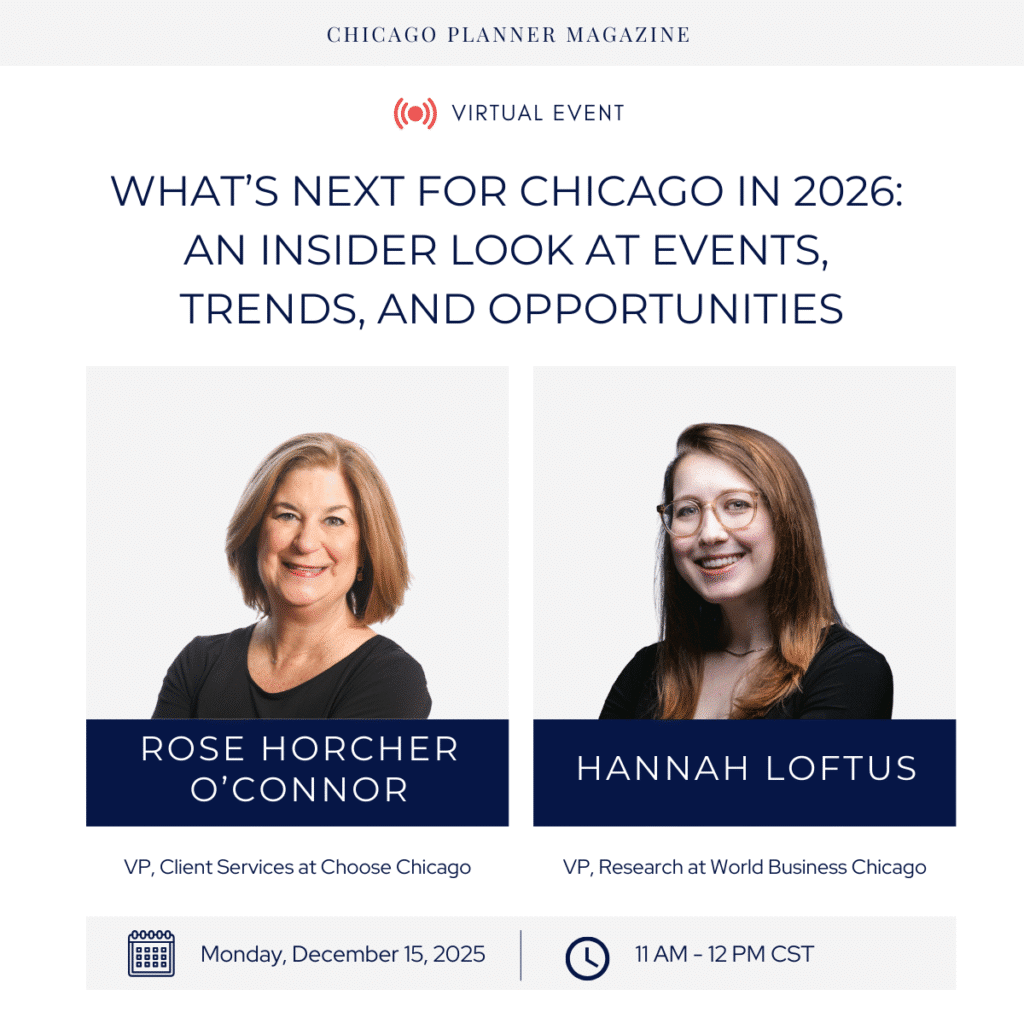
As an event planner, one of the most common things you will do is tour venues. Whether you’re planning a corporate gala, a wedding, or a private social celebration, the walkthrough is your chance to uncover all the details that can make or break your event.
Every venue is different, and so are the needs of each event. While you’ll want to tailor your questions depending on the specifics of your gathering, here is a comprehensive list of essential questions to help guide your next venue tour. These questions are designed to save you time, avoid surprises, and help you confidently decide if a venue is the right fit.
1. Guest Experience and Accessibility
Start by envisioning your guest’s journey from the moment they arrive. A smooth experience is key to a successful event.
- What are the parking options?
Is there valet, self-park, or a nearby garage? Is parking included? If not, how much does it cost, and is there the option to cover this expense for your guests? - Where is the main entrance for guests?
Is it clearly marked and accessible for all ability levels? If not, will anyone be available to readily assist, or is there an alternative entrance option? - Is the venue ADA compliant?
Are all spaces—including entrances, restrooms, and seating areas—accessible for guests of all ability levels? - Is there a designated area for coat check?
If not, can one be arranged? - Is there a designated area for smokers?
2. Restrooms and Cleaning
Clean and accessible restrooms are a non-negotiable for guest comfort.
- How many restrooms are on-site, and where are they located?
Are they easily accessible from the main event space? - Will the venue provide cleaning staff during the event?
Ask specifically about restroom maintenance and trash disposal during your event.
3. Load-In, Load-Out & Vendor Logistics
Managing vendors efficiently requires clarity on access and timing.
- What time can vendors and event staff begin setup?
- Is there a designated loading dock or entry?
- Is there a specific load-out time?
Can vendors return the next day to retrieve items, or must everything be removed by the end of the night? This is an important details because some vendors may charge additional fees for pickups within certain time frames, especially if it is late at night or very early in the morning. - Can packages or deliveries arrive before the event?
If so, is there a storage fee? - Who is the on-site contact on the day of the event?
Make sure you have a name and direct phone number.
4. Technical Capabilities: A/V, Music & Power
A successful event often hinges on the right technology, which requires the right set up and power support.
- What A/V equipment is available?
Ask about what, if any, a/v is available at the venue such as microphones, projectors, screens, lighting, etc., and whether there are rental fees. Many places have various fees to use this equipment, but some places may include certain a/v items in their rental fees. - Will there be an a/v tech onsite?
Depending on the venue’s setup, or how extensive your a/v needs are, it is good to understand who will be helping you manage the a/v, especially if something does not work or there is an issue. For a simple microphone, most places will not have a dedicated technician, but if you have extensive a/v needs, you need to understand how you will be supported during your event, and have clarity on the number of technicians versus the fees. - Is there a house sound system?
If yes, is it compatible with your needs (DJs, playlists, microphones)? - Where are electrical outlets located?
Knowing this helps with layout planning, especially for vendors and décor. - Is Wi-Fi available for guests and staff?
Is it free, or is there an upgraded option for larger groups or live streaming?
5. Food & Beverage Guidelines
Whether you’re bringing in a caterer or using in-house services, food and beverage policies can greatly affect your event budget and logistics.
- Is there an on-site kitchen or prep space for caterers?
This is essential for hot food service or plated dinners. - Can outside food be brought in?
If so, are there any limitations? - Is outside alcohol allowed?
Ask about the venue’s liquor licensing. Some locations in Chicago require a licensed caterer or vendor to serve alcohol, even if you provide it. - If the venue supplies alcohol, are corkage fees applied to specialty items?
Not every place allows outside beverages, but let’s say you’re planning a wedding and the bride and groom want a special champagne for the two of them to enjoy during the reception. Some venues will allow it with a corkage fee. It’s good to understand your venue’s policy on this, and any associated fees.
6. Staffing and Support
Good staffing can make a huge difference in how smoothly an event runs, so it’s important to understand what your venue will include. Some venues are full-service, while others allow you to have the space, but you’re responsible for a larger part of the event support. Make sure you are clear on exactly what is included with your venue of choice.
- Will there be dedicated staff assigned to the event?
This includes event coordinators, setup crews, security, or cleaning staff. Does it include managing vendors, someone to troubleshoot tech issues, or assistance overseeing any transitional elements of your event? - Are there any fees associated with staffing?
What fees might there be if you would like to have additional staff outside of what the venue normally provides? If they do not automatically include full staffing, is this something they can provide for an additional cost?
7. Décor and Signage
Clarify the venue’s rules before committing to any creative design concepts.
- What are the restrictions on décor?
Many venues don’t allow anything to be taped, nailed, or adhered to walls or ceilings. - Where can signage be placed?
Is there a lobby or foyer for directional signage or event branding? Are there restrictions on signage placement? If there is digital signage, is this included in venue fees?
8. Venue Operations & Fees
As a planner, it’s your job to be able to have a clear understanding of the full costing of an event, and understand any gaps you may have to fill with your own resources or added vendors, that the venue may not provide.
- How does billing work?
When are deposits due, and what is the cancellation policy? - Are there additional fees for anything shown on the tour?
Ask about fees for furniture, equipment, or unexpected add-ons. - What licenses or insurance does the venue carry?
Especially relevant if you’re bringing in food, alcohol, or large entertainment setups.
9. Bonus Tips for a Successful Walkthrough
Here are a few final things to keep in mind during your site visit:
- Bring a checklist or printed copy of these questions
It’s easy to forget key details during a walkthrough, make sure you’re prepared! - Take photos or videos of each room and detail
Reference them later for layout planning or presenting options to clients.
Ask for a detailed floor plan and preferred vendor list
These tools help you design the event layout and identify reliable vendor partners.




0 Comments